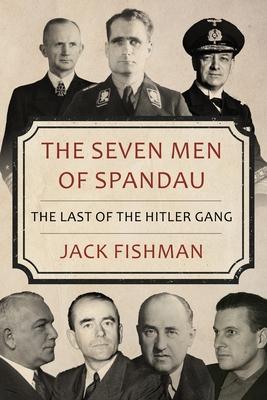The riveting story of what happened to the seven top Nazi war criminals in the aftermath of World War Two and the Nuremberg trials.
Who were they? What were their crimes? And why were they incarcerated in one of the most secure prisons in human history?This gripping study of human corruption and fallibility is the perfect book for fans of Volker Ullrich, Ian Kershaw and Peter Longerich. In 1945 seven of Hitler’s henchmen were incarcerated as solitary inmates of the vast Spandau prison in Berlin originally built to accommodate hundreds. Every conceivable precaution was taken to ensure escape was impossible for such high-profile prisoners. Hitler’s henchmen; Rudolf Hess, Konstantin von Neurath, Karl Dönitz, Baldur von Schirach, Erich Raeder, Albert Speer and Walter Funk had been tried and convicted for their complicity in Hitler’s campaign and had escaped the death penalty, unlike many of their former comrades. This extensively researched book has been constructed from innumerable sources including, in some cases, first-hand accounts from the men themselves, their families, friends, lawyers and enemies; from visits made to Berlin with their wives, from smuggled and authorised letters written in prison and authentic conversations between the prisoners. What is revealed are intimate details of the private lives of these once powerful men, their thoughts and reflections inside Spandau, their differing attitudes to their crimes and how these affected their relationships with each other. Also revealed is the complex and frustrating diplomatic and political in-fighting between the four Powers of the United States, Britain, France and the USSR, administering the gaol in the post war era. A situation that remained until September 1987 when, within weeks of the death of remaining prisoner Rudolf Hess, the bulldozers moved in to raze it to the ground. ’A fascinating book revealing the previously unknown thoughts, feelings, hopes and fears of these seven men... It will greatly interest both historians and general readers interested in historical and political events preceding and following the Second World War’ -British Book News ’Chilling but readable account of the history of the Third Reich’ - Bradford Telegraph and Argus’The author is eminent amongst investigative journalists and THE SEVEN MEN OF SPANDAU adds to a lengthening list of formidably researched, readable and important books ... a scholarly piece of research ... a gripping study in human corruption ... authoritative study of the working of Hitler’s Third Reich’ - The Book Exchange’Well pieced-together account of the seven leading Nazis imprisoned after the Nuremburg trial’ - Encounter’Fishman’s massively detailed book gives us what is surely as much of the truth as we shall ever know’ - Bath and West Evening Chronicle’This book faithfully fulfils its purpose, which is to keep the lessons of the Nazi era fresh in mind’ - Eastern Daily Press’An authoritative and interesting book’ - Kentish Times| FindBook |
有 1 項符合
The Seven Men of Spandau: The Last of the Hitler Gang的圖書 |
 |
The Seven Men of Spandau: The Last of the Hitler Gang 作者:Fishman 出版社:Sapere Books 出版日期:2024-03-31 語言:英文 規格:平裝 / 584頁 / 22.86 x 15.24 x 3 cm / 普通級/ 初版 |
| 圖書館借閱 |
| 國家圖書館 | 全國圖書書目資訊網 | 國立公共資訊圖書館 | 電子書服務平台 | MetaCat 跨館整合查詢 |
| 臺北市立圖書館 | 新北市立圖書館 | 基隆市公共圖書館 | 桃園市立圖書館 | 新竹縣公共圖書館 |
| 苗栗縣立圖書館 | 臺中市立圖書館 | 彰化縣公共圖書館 | 南投縣文化局 | 雲林縣公共圖書館 |
| 嘉義縣圖書館 | 臺南市立圖書館 | 高雄市立圖書館 | 屏東縣公共圖書館 | 宜蘭縣公共圖書館 |
| 花蓮縣文化局 | 臺東縣文化處 |
|
|
圖書介紹 - 資料來源:博客來 評分:
圖書名稱:The Seven Men of Spandau: The Last of the Hitler Gang
|










